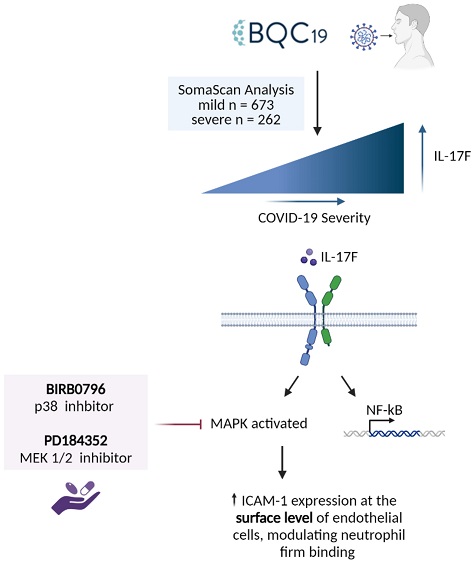Nikhil Prasad Fact checked by:Thailand Medical News Team Oct 19, 2024 1 year, 3 months, 1 week, 3 days, 1 hour, 7 minutes ago
Medical News: A recent study conducted by researchers from McGill University, Canada, and Western University, Ontario, sheds new light on the role of the immune system in severe COVID-19 cases. The study focuses on a specific protein called IL-17F, which appears to play a key role in worsening COVID-19 symptoms. This
Medical News report delves into the research findings and their implications for understanding the disease.
 Medical-News-IL-17F-May-Hold-the-Key-to-Disease-Severity-in-COVID-19
Medical-News-IL-17F-May-Hold-the-Key-to-Disease-Severity-in-COVID-19
COVID-19 has posed a global health crisis, affecting millions and leaving scientists racing to understand the causes of severe cases. While most infections result in mild symptoms, a significant portion of patients develop severe complications, including difficulty breathing and even organ failure. The study reveals that higher levels of IL-17F, a cytokine, are closely linked to the severity of COVID-19.
Key Findings: IL-17F’s Impact on COVID-19 Patients
Cytokines are proteins that help regulate the body’s immune responses. Among them, IL-17 cytokines, including IL-17A and IL-17F, are particularly important in mobilizing immune cells like neutrophils. These proteins help the body fend off infections by activating immune responses. However, when this response goes unchecked, it can lead to harmful inflammation.
In this study, plasma samples were collected from hospitalized COVID-19 patients. Researchers observed that, unlike IL-17A, IL-17F levels were significantly elevated in patients with severe COVID-19. This indicates that IL-17F may be one of the main drivers of complications in severe cases. On the other hand, IL-17A, which shares many similarities with IL-17F, did not show a significant rise in severe cases.
The study compared two groups of patients: those with mild symptoms and those with severe symptoms, such as acute respiratory distress syndrome (ARDS) and blood clotting problems. IL-17F levels were markedly higher in the severe cases, suggesting a direct relationship between this cytokine and the intensity of the disease.
How IL-17F Promotes Neutrophil Adhesion
IL-17F seems to exacerbate COVID-19 severity by promoting a specific immune response that causes neutrophils - white blood cells critical for fighting infections - to stick to blood vessels. This is known as neutrophil adhesion. Normally, this process helps neutrophils reach infected tissues. But in severe COVID-19 cases, this adhesion may lead to excessive immune responses that can damage organs and tissues.
In the study, researchers exposed endothelial cells, which line the blood vessels, to IL-17F in a laboratory setting. The endothelial cells were found to increase the expression of ICAM-1, a molecule that helps neutrophils attach to the blood vessel walls. As a result, the blood vessels become inflamed, contributing to the dangerous complications seen in severe COVID-19 cases, such as blood clots.
This excessive neutrophil adhesion is a hallmark of COVID-19-related immunothrombosis, where blood clots form d
ue to overactive immune responses. This can lead to strokes, heart attacks, and other life-threatening conditions in patients with severe disease.
Pathways That Regulate IL-17F Activity
The study also discovered that two signaling pathways, ERK1/2 and p38 MAPK, are responsible for regulating how IL-17F affects the body. These pathways are crucial for increasing ICAM-1 surface expression, which, as noted, leads to neutrophil adhesion.
In their experiments, the researchers used specific inhibitors to block these pathways and found that doing so reduced both ICAM-1 expression and neutrophil adhesion. This points to potential treatment strategies for severe COVID-19. By targeting these pathways, it may be possible to reduce the harmful inflammation caused by IL-17F.
The introduction of ERK1/2 and p38 MAPK inhibitors in the study showed promising results, where neutrophil adhesion was reduced to normal levels. This suggests that these pathways are central to the damaging effects of IL-17F in COVID-19. If these pathways can be targeted in future therapies, the severe complications seen in critically ill patients might be alleviated.
Future Implications for COVID-19 Treatment
The findings open up a potential new avenue for treating severe COVID-19 cases. While earlier attempts to block cytokine activity - such as targeting IL-17A - have failed to show significant benefits, this study suggests that IL-17F might be a better target for intervention.
The results raise the possibility that drugs that specifically inhibit IL-17F or its downstream signaling pathways (ERK1/2 and p38 MAPK) could help reduce the severity of COVID-19 by controlling the harmful immune response. This is especially relevant for patients who experience life-threatening complications like ARDS and blood clotting.
This discovery is also significant because it suggests that not all cytokines in the same family behave in the same way. While IL-17A and IL-17F are closely related, they have distinct roles in the body’s immune response. Targeting the right one could be crucial in preventing the immune system from overreacting and causing severe damage in COVID-19 patients.
Conclusion
In conclusion, this study highlights IL-17F as a critical player in the immune response seen in severe COVID-19 cases. By promoting neutrophil adhesion to blood vessels through the activation of ICAM-1, IL-17F contributes to the damaging inflammation and blood clotting associated with severe symptoms. The study also identifies the ERK1/2 and p38 MAPK pathways as essential regulators of IL-17F’s harmful effects.
Future research could focus on developing drugs that inhibit these pathways or directly target IL-17F to mitigate severe complications. While more research is needed, these findings represent a significant step forward in understanding how to manage and treat severe COVID-19 cases. The hope is that by controlling the overactive immune response, fewer patients will progress to critical illness.
The study findings were published in the peer-reviewed journal: Frontiers in Immunology.
https://www.frontiersin.org/journals/immunology/articles/10.3389/fimmu.2024.1452788/full
For the latest COVID-19 News, keep on logging to Thailand
Medical News.
Read Also:
https://www.thailandmedical.news/news/interleukin-26-linked-to-severe-covid-19-and-lung-conditions
https://www.thailandmedical.news/news/covid-19-increases-the-risk-of-heart-attacks-through-interleukin-6
